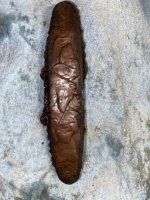bottlecap
Hero Member
Some of you have probably seen some of my threads and noticed I recently started panning. So far I have found some gold, nothing substantial but different sizes ranging from tiny to really tiny. I am located in Mn. and we have gold in some of the rivers and creeks here, all pretty small stuff, what I am wondering is how does it get there? I have done some reading about glaciers, flooding etc. but still don't know that I quite grasp the whole concept and I have even seen some differing opinions on the matter. Our rivers here flood like crazy, we just went through a good week and a half with rain every day or night, rivers were raging. Is the gold I find just gold sitting in the dirt banks of the river that gets cut out of the river bank and into the river? Is it carried from Canada? I am also wondering if small gold will sit in gravel or if it will continually sink until it gets to a hard layer. Some of the best gold I have found wasn't on a hard layer of any kind, just in gravel with nothing to stop it from sinking, at least nothing within the couple feet I had dug down. Other spots it seems like I don't find a thing unless I hit the rock hard clay layer on the river bottom. What the heck? Just confused. I feel the better I understand where it comes from and how it gets there the better chance I have at finding it. Thanks for any info!
Upvote
0







 Couldn't agree more. Sometimes (no-always for me) it's a very small pocket here and there...and mostly not there. Still trying to get to the rhyme and reason part of it myself.
Couldn't agree more. Sometimes (no-always for me) it's a very small pocket here and there...and mostly not there. Still trying to get to the rhyme and reason part of it myself.



